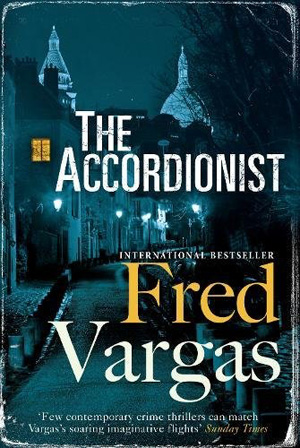Translated by Siân Reynolds — Retired investigator Louis Kehlweiler is working on a translation of a book about Otto Von Bismark. He is deep in thought, but a headline he saw out of the corner of his eye keeps distracting him from the work at hand. An article about two women who have been murdered calls to him from page six of the newspaper. He wants to avoid it, tries to, but eventually his intrigue gets the better of him and he cracks it open and begins to read.
The Accordionist is the third and final book of Fred Vargas’s Three Evangelist series. Fred Vargas, the pseudonym for the French archeologist and four-time CWA International Dagger winner Frédérique Audoin-Rouzeau, wrote this series early in her career. The Evangelist books were written in 1995, 1996, and 1997 after she had published only the first of her lauded Commissaire Adamsberg series. They have been translated sporadically over the last decade, presumably because the Adamsberg translations have taken precedence.
Kehlweiler’s reading of the article makes him wonder whether or not he should get involved in solving the crime. Vargas uses the dilemma to engage and frame the story as a thought-provoking existentially driven meditation on why people engage in detective work, or fight to right wrongs in the world.
Meanwhile, in the heart of Paris, a simple-minded 20-something accordionist named Clement seeks out the retired prostitute Marthe, a returning character from the previous book, Dog With Have His Day, for help. Years before she raised him like a mother after Clement’s parents abandoned him. With nowhere to turn, the busker appeals to Marthe, explaining that he is being framed for the page six murders, swearing his innocence. The complicated and intricate framing points all fingers at Clement, but Marthe is sure that the boy she once cared for and tutored couldn’t commit such crimes. Marthe, in turn, seeks out Kehlweiler.
The setup of Vargas’ story zips along. Her writing is concise and compelling. She does a great job of adding to what we know of these series characters, who are fantastic and original creations across the trilogy, which concludes here. The writing is sharp and economical but that is not to say it is bare bones prose. Rather, her work contains tons of short but poetic digressions that are often odd and beautiful. The small meditations peppered throughout this novel are some of her best. The Paris depicted here is a messy one and the unfastidiousness that swirls is charming especially compared with romanticized Paris found in other contemporary crime novels.
Kehlweiler’s reluctance to engage with the murders is eventually superseded by Marthe’s appeal to him. He seeks out the Three Evangelist for help. The title characters are three historians who live in doss house. The men are not detectives but rather use their scholarly powers and intelligence to solve crimes. The Evangelists are fun, funny, and incredibly quirky. Vargas uses these characters well and we can only suspect that her work as an archeologist and scholar influenced her creation of the trio.
Clement’s past begins to figure into the debacle and an episode from it becomes the focal point of the investigation the men take. The novel is compelling through and through. Vargas’ skill is her humanity and it is all over this work. The relationship between Marthe and Clement is at the heart of this book.
The Accordionist a great read and a perfect conclusion to this trilogy. The book will thrill Vargas fans, and those new to the series or the writer will miss nothing by jumping in and reading. The book is wonderfully translated by the Cardiff native Siân Reynolds, who has translated the majority of the Vargas books into English.
Harvill Secker
Print/Kindle/iBook
£9.99
CFL Rating: 5 Stars












